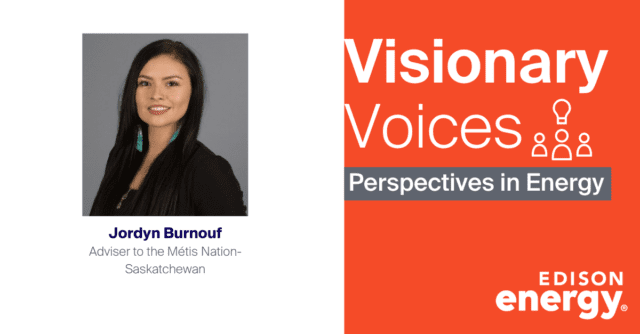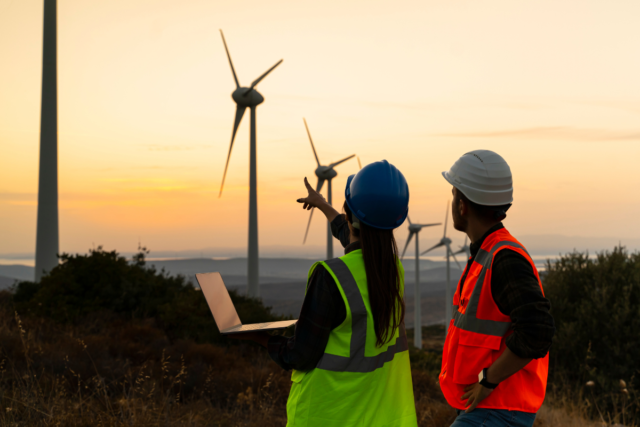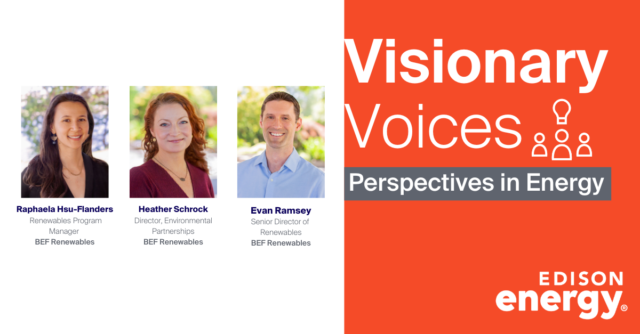
August 25, 2022
The clean energy sector is still struggling with diversity. Time to shift the “business as usual” paradigm
By Elana Knopp, Senior Content Writer

Edison Energy recently sat down with Kristen Graf, Executive Director at WRISE (Women of Renewable Industries and Sustainable Energy), a Brooklyn-based organization dedicated to promoting education, cultivating leadership, and working to recruit, retain, advance, and inspire systemically excluded communities in pursuing a sustainable and equitable future.
Are Women Really Interested in Renewable Energy Technologies? That was the question posed in a 25-year-old report on the role of women in the sustainable energy sector.
The analysis addresses the stereotype that “women are not technologists” and not capable–even when provided with appropriate support–of building, operating, and maintaining sophisticated technologies. The report also cites the lack of data and documentation around women in renewable energy, noting that the actual experience of women in the clean energy sector has been “fairly limited and anecdotal to date.”
The question of whether women were even “interested” in renewable energy a mere 25 years ago is jarring. Indeed, it is a stark reminder of how long women have been shut out of mainstream workforces, and how pervasive that exclusion has been.
“Over the last decade, we’re definitely doing better,” said Kristen Graf, Executive Director at WRISE. “Are we doing as well as we could do? Not even close. For mid-career renewable developers, there are a lot more women these days. C-suite–still really hard, but there are a few more. Technicians and manufacturing–still extremely hard to get them in there. It’s critical to break it down beyond gender. We have a lot more white women, but how are we doing with race and ethnicity across the board? We still have a lot of work to do.”
Currently, white men dominate the clean energy sector, while Black, Hispanic and Latino, and female workers are less represented in clean energy than they are across the rest of the economy, according to a recent E2 report. The analysis warns that this lack of diversity threatens to leave these groups behind in the clean energy transition.
Female participation in the clean energy sector has actually decreased over the past four years, exacerbated by women suffering a larger economic fallout from the Covid pandemic than men. Since 2017, the presence of women in clean energy has dropped more than two points, from 29 percent to 27 percent, compared with 48 percent of all jobs nationally.
“Women are making slightly different decisions and risk assessments about travel and conferences,” Graf said. “I’m interested in understanding how that plays out in terms of business and deal making and who gets to be at the table now. How do we continue to call into question what this needs to look like going forward. We can’t afford to return to a pre-pandemic business as usual approach. Things have changed, and in order to succeed, we as an industry also need to change.”
Much of that change is deeply embedded in the growing realization that the clean energy transition cannot move at the speed and scale it should in a society that is still too far removed from the basic principles of equity, diversity, inclusion, and justice.
Yet there has been change. It may be the confluence of events that have brought society closer to an inflection point. Globally, the Covid pandemic and the increasing threat of climate change–and their disproportionate impacts on underserved communities–have shone a light on existential inequities and injustice.
Domestically, the U.S. continues to grapple with a nation divided by ongoing racial and gender inequities and renewed attacks on basic civil liberties. This has catapulted the issues of social and environmental justice from the theoretical to a core underpinning of today’s corporate bottom line. Now, there is increasing scrutiny over C-suites across industry–and the clean energy sector is no exception.
“It’s definitely a pivotal time,” said Graf. “On the one hand, you have folks that are so engaged and committed to the kind of change we’ve been wanting for decades and are actually starting to move things forward. I have this sense that there’s a majority of business and corporate leaders who are on board in recognizing climate change and moving that forward, recognizing the need for diversity and equity and moving that forward. But you still have this really vocal space of resistance with folks that say, ‘This doesn’t exist, it isn’t important.’”
There are a host of data-backed business cases that show a diverse workforce at both the management and executive levels drives revenue. Diverse teams have a broader range of skills and experience, boost creativity and innovation, and create greater opportunities for professional growth.
“Engagement and internal pressure from within companies, clients, and the supply chain around racial equity are happening on a scale that I haven’t seen before within the sector,” Graf said. “I think there’s a huge opportunity to really shift the conversations and address bigger, overarching questions in terms of how we do this kind of business, how we run our organizations, who’s stepping up into leadership and how, and how we hold them accountable. When you actually get down to do the work, you get to see who’s truly committed or not and where things are failing.”
WRISE is currently working with several key sponsors to launch the Center for Workforce Equity, which will serve as a resource and space for ongoing conversations on how companies are navigating culture, equity, and inclusion, and to ensure that these core values are driven across all levels of the organization.
“There will be some deep thinking about who they are, how they live their own values, how bias plays out in terms of all the weedy processes–unconscious bias and downright bias,” Graf said. “It’s making sure that the folks at the top are going beyond simply putting out the statements and saying the right things but are making sure that real change is taking place and that the accountability is there.”
GRID Alternatives, a national solar nonprofit, and WRISE are teaming up at RE+ to provide a dedicated space for job seekers and clean energy companies to connect! Learn more about the Clean Energy Job Fair.
Check out additional conversations with leading experts from across the industry in our Visionary Voices: Perspectives in Energy Series.
Join Our Mailing List
Supply Chain Decarbonization: Your Guide is Here!
Download our new white paper on establishing a successful decarbonization program.
Read More



